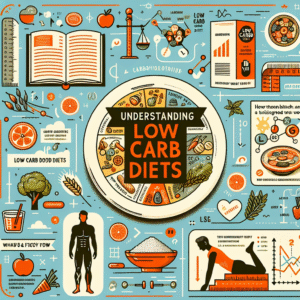What is a Low Carb Diet?
A low carb diet is a dietary approach that limits carbohydrate intake, focusing instead on proteins and fats. The primary idea is to reduce the intake of sugars and starches, which are broken down into glucose. This method is popular among those looking to lose weight or manage certain health conditions, such as diabetes.
Types of Low Carb Diets
Various low carb diets exist, each with its own set of guidelines and philosophies:
- Keto Diet: Characterized by a very low carbohydrate intake (usually less than 20-50 grams per day) and a high fat intake, aiming to enter a state of ketosis.
- Atkins Diet: A phased diet that starts with extremely low carbs and gradually increases them while focusing on protein and fats.
- Paleo Diet: Focuses on whole foods and eliminates processed foods, grains, and dairy. It emphasizes hunting and gathering-like foods.
- South Beach Diet: A balanced approach that limits high-glycemic carbs initially but includes complex carbs as the diet progresses.
How Low Carb Diets Work
Low carb diets primarily aim to alter the body’s energy usage. When you consume fewer carbs, the body seeks alternative energy sources. This process leads to a reduction in insulin levels:
- Ketosis: By lowering carbohydrate intake, the body shifts into ketosis, a metabolic state where fat becomes the primary source of energy.
- Reduced Insulin Levels: Lower carbohydrate consumption results in lower insulin levels, which helps in fat burning and modulating hunger.
- Appetite Regulation: Some studies suggest that high protein and fat consumption can help control hunger hormones, resulting in reduced calorie intake.
Benefits of Low Carb Diets
Embracing a low carb diet offers numerous benefits, particularly for those seeking weight loss or health improvement:
- Weight Loss: Many individuals report significant weight loss on low carb diets due to reduced hunger and lower calorie consumption.
- Blood Sugar Control: Low carb diets can improve blood sugar control and are particularly beneficial for those with type 2 diabetes or insulin resistance.
- Improved Heart Health: Some studies indicate that low carb diets can help reduce triglycerides and increase HDL cholesterol levels—important markers for heart health.
- Increased Energy: Many people find they have more consistent energy levels without the blood sugar spikes and crashes associated with high carbohydrate diets.
Challenges of Low Carb Diets
While low carb diets can be effective, they may come with challenges:
- Initial Side Effects: Many people experience “keto flu” during the initial phase, with symptoms including headaches, fatigue, and irritability.
- Nutrient Deficiencies: Restricting entire food groups can lead to potential deficiencies in important nutrients such as fiber, vitamins, and minerals.
- Sustainability: Some individuals find it challenging to stick to a low carb regimen long-term, leading to weight regain.
- Social Situations: Dining out or social gatherings may present challenges for those following strict low carb guidelines.
Conclusion
Low carb diets can be an effective strategy for weight loss and managing health conditions. By focusing on the reduction of carbohydrate intake, these diets encourage the body to utilize fat for energy, which can lead to various health benefits. However, it is essential to approach any dietary change mindfully, considering both the potential benefits and challenges. Consulting with a healthcare or nutritional professional can provide tailored guidance and ensure balanced nutrition.
FAQs
1. Can I eat fruits on a low carb diet?
Yes, but it depends on the specific diet you’re following. Low sugar fruits such as berries are generally acceptable in moderation, while high-carb fruits like bananas may need to be limited.
2. Will I lose muscle with a low carb diet?
If protein intake is sufficient and you engage in resistance training, you can maintain muscle mass. It’s crucial to consume adequate protein to aid muscle preservation.
3. What should I do if I experience side effects?
Experimenting with hydration and electrolytes can help, but if side effects persist, consult a healthcare professional for personalized advice.
4. How do I know if a low carb diet is right for me?
Individual responses to dietary changes can vary significantly. It’s best to consult with a healthcare professional or registered dietitian to determine if a low carb diet aligns with your health goals and needs.
5. Can I eat dairy on a low carb diet?
Many low carb diets allow for full-fat dairy; however, some may choose to limit dairy based on personal health goals or intolerances.


















